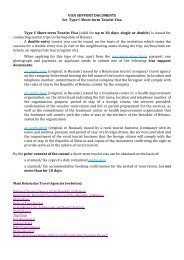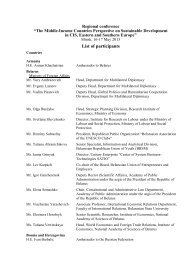Human Development Report 2013 - UNDP
Human Development Report 2013 - UNDP
Human Development Report 2013 - UNDP
Create successful ePaper yourself
Turn your PDF publications into a flip-book with our unique Google optimized e-Paper software.
and sustainability are fully incorporated intofuture policies and strategies. As the 2011<strong>Human</strong> <strong>Development</strong> <strong>Report</strong> also stressed, continuedhuman development progress is unlikelyif inequality and environmental destruction arenot moved to the forefront of policy discussions.Under worst case scenarios, a businessas usual approach to development combinedwith environmental crises could reverse humandevelopment gains in the South or make thisprogress unsustainable.Concerns for the future apply in the Northas well, where low economic growth, highunemployment rates and austerity measuresthreaten the high levels of human development.In both the North and the South, ruling elitescannot afford to ignore these threats to socialinclusion and social welfare, given the risingcall for fairness and accountability—from citizens,communities and civil organizations athome and abroad, facilitated by the explosionof social media.To support policymaking and research thatadequately address these contemporary andemerging global realities, measures and analyticsare needed that broaden the human developmentconcept. The <strong>Human</strong> <strong>Development</strong><strong>Report</strong> and the family of human developmentindices must meet this challenge by movingbeyond a focus on measuring individual capabilitiesto incorporate society-level capacities,concerns and perceptions. Individual achievementsin health, education and income, whileessential, do not guarantee progress in humandevelopment if social conditions constrain individualachievements and if perceptions aboutprogress differ. The turmoil in several countriesin the Arab States is a reminder that people,especially the young, who are better educatedand healthier than previous generations put ahigh premium on meaningful employment, onexercising a voice in affairs that influence theirlives and on being treated with respect.Furthermore, the promotion of social cohesionand social integration, a stated objectiveof development strategies of countries suchas Brazil, is based on evidence of the positivedevelopment impact of a unified society. Moreequalsocieties tend to do better in most measuresof human development—from teenagepregnancies to suicide rates—than do unequalsocieties. This finding is borne out by studiesin both developed and developing countries.These society-level aspects of developmenthave been underappreciated in past conceptualizationsof development but are proving to beessential elements of any viable and desirablelong-term development path.Helping other countries catch upAll developing countries are not yet participatingfully in the rise of the South. The pace ofchange is slower, for instance, in the majorityof the 49 least developed countries, especiallythose that are landlocked or distant fromworld markets. Nevertheless, many of thesecountries have also begun to benefit fromSouth–South trade, investment, finance andtechnology transfer. For example, there havebeen positive growth spillovers from China toother countries, particularly close trading partners.To some extent, this has offset slackeningdemand from developed countries. Growthin low- income countries would have been anestimated 0.3–1.1 percentage points lower in2007–2010 had growth fallen at the same ratein China and India as in developed economies. 2Many countries have also benefited fromspillovers into important human developmentsectors, especially health. Indian firms, forexample, are supplying affordable medicines,medical equipment, and information and communicationstechnology products and servicesto countries in Africa. Brazilian and SouthAfrican companies are having a similar impact.Rising competitive pressuresNevertheless, the arrival of exports from largercountries can also have disadvantages. Largecountries generate competitive pressures thatmight stifle economic diversification and industrializationin smaller countries. Yet thereare examples of industrial revival followingsuch competitive jolts. A competitive roletoday may easily turn into a complementaryrole in the future. Moving from competition tocooperation seems to depend on policies thatenable local agents to make the most of the newsituation.Increasingly, the most important engineof growth for countries of the South is theirdomestic market. The middle class is growingIndividual achievementsin health, education andincome, while essential,do not guarantee progressin human development ifsocial conditions constrainindividual achievementsand if perceptionsabout progress differOverview | 3
















